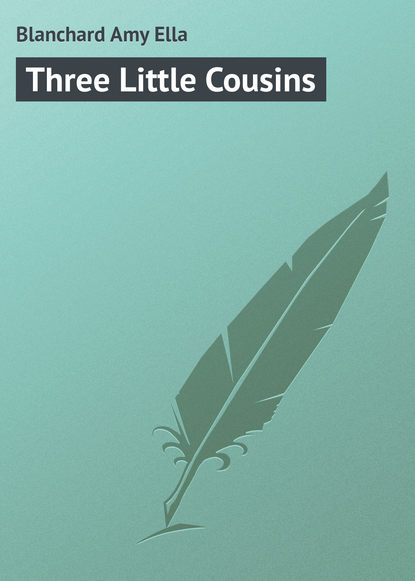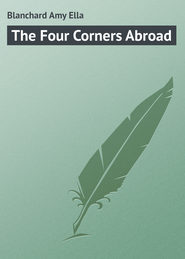По всем вопросам обращайтесь на: info@litportal.ru
(©) 2003-2024.
✖
Three Little Cousins
Настройки чтения
Размер шрифта
Высота строк
Поля
"Is it grand larceny?"
"I don't know what that is."
"It is stealing something worth while, not like a loaf of bread nor a pin, nor anything of that kind. You know the copy-book says: 'It is a sin to steal a pin.'"
"Is it a sin to lose a pin?"
"Why, no, not unless it is a breastpin or a scarf-pin and you wilfully throw it to the fishes."
Molly drew a sigh of relief. "Suppose you lose something that belongs to some one else; is that a sin?"
"Why no, it is a misfortune, not a crime. You don't do it on purpose, you see, and in fact I think the loser generally feels worse than the one the thing belongs to. What have you lost? Not my favorite scarf-pin, I hope. Have you been using it to pin rags around your doll?"
"Oh, Uncle Dick, of course I haven't. I was only asking, just because I wanted to know."
"As a seeker after ethical truths. It does you credit, Miss Shelton. You will probably join a college settlement when you are older, or at least write a paper on moral responsibilities."
"Oh, Uncle Dick, you do use such silly long words."
"I forget, when you tackle these abstruse subjects. I will come down from my lofty perch, Molly. What more can your wise uncle tell you?"
"If a person loses something very costly, something that has been lent to her, ought she to pay it back?"
"It is generally supposed to be the proper thing to replace it, but half the world doesn't do it; sometimes because they can't and sometimes because they don't want to. Then, sometimes the one to whom the thing belonged, insists upon not having it replaced, and would feel very uncomfortable if it were, though, from the standpoint of strict honesty, one should always make good any borrowed article whether lost, strayed or stolen."
"Would you insist upon its not being made good?"
"I shouldn't wonder if I were that kind of gander."
"Would Aunt Ada?"
"I think she's probably that kind of goose."
"Oh, I am so glad she is a goose."
"Glad who is a goose?" said Aunt Ada from the doorway.
"We were talking about you," said her brother laughing. "Molly was calling you a goose."
"Oh, Uncle Dick, you began it."
"Did I? Well, never mind. I smell those rolls, Molly, and I feel that I can demolish at least six. Come on, let's get at them."
Although she had not really carried the subject as far as she wanted, Molly felt that matters were not so bad for Mary as they had at first appeared, therefore, she took the first opportunity to reassure her on that point. Polly walked off to the Whartons' immediately after breakfast, announcing with quite an air of wishing it generally known that she would probably spend the day with Grace in the woods, and that Luella had given her a lunch to take.
Miss Ada smiled when this announcement was made. She realized that there had been some childish squabble and she never paid much attention to such. Mary saw at once that Polly was jealous of Molly's attentions to her small self, and Molly felt so grieved at Polly's desertion that she could hardly keep back the tears. It was very hard to do right in this world, she thought. If she were loyal to Mary she must lose Polly's companionship, and she did love to be with Polly more than any one she had ever known. If she clung to Polly, she must give up Mary at a time when Mary most needed her.
She looked after Polly skipping over the hummocks to Grace Wharton's and wished she were going, too. It was so lovely in the woods. As if reading her thought, her Aunt Ada came up and put a hand on her shoulder. "Suppose we all take our luncheon in the woods to-day," she said. "It is too lovely to stay indoors a minute. Should you kitties like to go? Dick is to be off sailing with Will Wharton and we three could have a nice quiet time. I'll take some books; you can have your dolls, and we'll go to Willow Cove."
"That's where Polly is going," said Molly quickly.
Aunt Ada smiled. "Suppose we go to Elton woods instead, then."
"I like it better anyhow," said Molly truthfully. "I'd like nothing better than to spend the day there, you dearest auntie."
"Then there we will go. Luella wants the day off, anyhow. She says she must go to town to have a tooth out, for 'the tooth aches something awful.' That is the third since we came. If she keeps on at this rate, she will not have a tooth left in her head by fall. It will be much easier to have a nice little lunch in the woods than to cook a dinner at home, don't you think? Suppose you and Mary run over to Mrs. Fowler's and see if she can let us have a boiled lobster; she generally is ready to put them on about this time of day, and you might stop at Skelton's on your way back and get some of those good little ginger-snaps."
"Aunt Ada is such a dear," said Molly, as the two started off. "I don't believe she would ever, ever want you to get another pin, Mary, and if I were you I would tell her all about it to-day; it will be such a good chance."
"I'll see about it," said Mary evasively.
There was no lovelier spot on the Point than Elton woods. Here the great trees grew to the very edge of the cliffs, and the way to them was through paths bordered by ferns, wild roses, and woodland flowers. In some places the trees wore long gray beards of swaying moss and stood so close together that only scant rays of daylight crept under them; in others they shot up high and straight above their carpet of pine-needles, which made a soft dry bed for those who lingered beneath them to gaze at the white-capped waves chasing each other in shore, or who, lying down, watched the fleecy clouds drifting across the sky. Near by was a pebbly beach where one could gather driftwood for a fire, or could pick up smooth water-washed stones to build walks and walls for tiny imaginary people. There was no end of the material the place afforded for amusement, and when they reached there, Molly eagerly fell to devising plays.
Yet, alas! She missed Polly's fertile brain and imaginative suggestions. Polly was always able to discover fairy dells and gnome-frequented caves. It was she who invented the plays which were the most delightful. Mary was rather tiresome when it came to anything more than sober facts. She would play very nicely with the dolls, but, when it came to make-believe creatures, she was sadly wanting, and the best response Molly could expect to get when she built a fairy dwelling was: "Oh, I say, that is a proper little house, isn't it?" or "What a duck of a tree that is you are planting; it is quite tiny, isn't it?"
"We always take some of these little bits of trees home with us," Molly told her, "and they live ever so long."
"I wonder could I take one to England," said Mary.
"Why, yes, I should think you could easily. We will get some the very last thing, and I am sure they'll live quite a while."
"It would be jolly nice to have one, wouldn't it?" said Mary as she watched Molly patting the ground smooth around the one she had just planted in the fairy garden. "I'd like to take some pebbles and some starfish, too. Reggie would be so pleased with them; he would be quite vexed if I brought him none after telling him about them."
"How often you say vexed, don't you?" remarked Molly. "We hardly ever say vexed."
"What do you say?"
"Oh, I don't know; we say mad and angry and provoked."
"But then I really mean vexed," returned Mary after a moment's thought. "I don't mean anything else," and Molly had nothing more to say.
It was after they had finished the lobster, the egg sandwiches, the buttered rolls and gingersnaps and were delicately eating some wild strawberries the children had gathered, that Molly made a sudden resolution to plunge Mary into a confession.
"If you lent some one a diamond pin and she were to lose it would you be very – very vexed, Aunt Ada?" she asked, after a hasty glance at Mary.
"If I possessed a diamond pin I might be, but as I haven't such a thing I couldn't be vexed," her aunt said.
Mary jumped to her feet, startled out of her usual reserve.
"But, Aunt Ada, you did have one!"
"When, please? You must nave dreamed it, Mary, dear."
"But you did have. Oh, do you mean you know it is lost?"
It was Miss Ada's turn to look surprised. "What do you mean, child?" she said knitting her brows. "I never had a diamond pin to my knowledge. I always liked diamond rings, and I have two or three of those, but a pin I never possessed. What are you talking about?"
Mary laced and unlaced her fingers nervously. "I mean the one you lent me to wear the night we dressed up for the party at Green Island. Was it some other person's, then? Oh, Aunt Ada, had some one lent it to you, for if they did" – she faltered, "I lost it coming home." She sank down at Miss Ada's feet on the mossy ground and buried her face in her aunt's lap.











